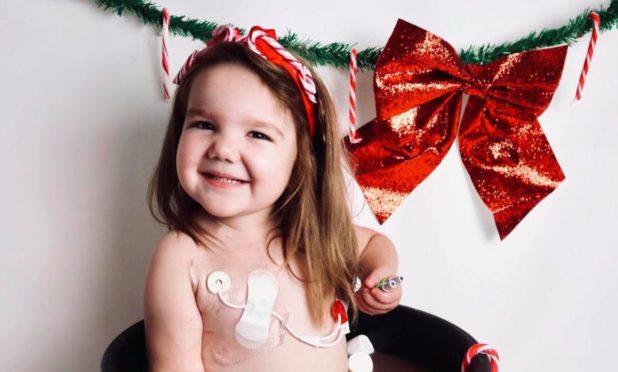A family in Easter Ross have been left in limbo as health officials postpone their four-year-old daughter’s lifesaving transplant for a third time due to Brexit.
Adeline Davidson was in line to receive a stem cell transplant at the beginning of next year to treat a rare form of blood cancer.
Her parents Steph, 26, and Jordan, 28, from Alness were praying it would be “third time lucky” after a series of complications and last-minute hitches left them still desperate for the transplant to go ahead.
However just days before Christmas, the family’s hopes have been quashed as doctors opted to postpone the procedure until February due to Brexit complications.
Registers across the country issued warnings to health officials to cancel transplants at the start of the New Year as delays in shipping blood products overseas had left them unsuitable for use.
Adeline’s devastated mum said: “The consultant could have said a million things and I don’t think I ever would have thought of Brexit.
“I answered the video call and it began with general introductions and then the consultant said so you will know about Brexit.
“I was thinking that’s an awful weird way to start a conversation and frankly I don’t really care about Brexit but she said these are the issues we are facing.
“In my head I was just thinking, how is this possible? How can another thing that’s really got nothing to do with us personally be stopping Adeline from getting treatment again?”
The four-year-old requires a specific type off marrow, processed by a centre outwith the UK, which is then brought to the country by road.
Mrs Davidson says she struggles to understand why life-saving treatment such as Adeline’s is not made a priority.
She added: “Brexit has been going on for ages and everyone is bored of it but who would have thought of all the pros and cons, whichever side you were on, that something like life-saving blood products, organs and transportation would be stopped or struggle to get through. It’s just ridiculous.
“We are talking about life-saving treatment, so you think things would be put aside for that – but no.
“I don’t understand how we are in this position yet again. We are having to sacrifice because of things out with our control.”
A spokesman from the Department of Health and Social care said: “We are working closely with the health and care system, suppliers, industry and the Devolved Administrations to put in place robust measures to help maintain the continued supply of medicines and medical products to the whole of the UK beyond at the end of the transition period, including organs, bloods, tissues and cells.”
The 26-year-old mother-of-three is worried about the potential implications of the delay, not only on Adeline’s health but the eligibility of their daughter’s donor.
She fears the cancellation could leave them back at square one.
“We have had so many rubbish things happen, it’s almost like tempting fate waiting but we have no choice,” she said.
“I think it is the right call in that sense but it means another month more that we are waiting, taking risks and not seeing anybody.”
An NHS spokesman said: “NHS Highland is extremely sympathetic to patients that have had their treatment delayed or postponed and we are working to ensure their treatment is rescheduled as soon as possible.”
A Scottish Government spokeswoman said: “Scheduling of transplants are a matter for the transplant unit, based on clinical decisions and priorities, though we appreciate it is extremely frustrating for families when stem cell transplants or other operations need to be delayed.
“We understand current border closures due to concerns about the new variant of Covid-19 may make it more challenging to import stem cells from outside the UK, but all partners are working hard to overcome any difficulties and enable transplants to proceed wherever possible.”
Ann O’Leary, director of donor and transplantation services at Anthony Nolan, added: “Our wonderful staff team are working alongside tireless NHS colleagues. Together we are working around the clock to keep stem cell donations moving during this difficult period, to save patients’ lives.’
“Although we are not directly in touch with Adeline’s family, we know how difficult this year has been for patients in need of a transplant.”
